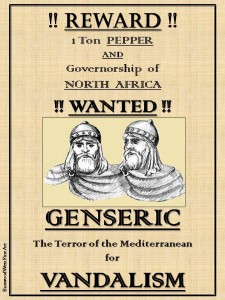Today is the birthday of Frederick the Great! Genius is rare in royalty; in Prussian royalty it is extraordinary. Frederick was unique: imagine Oscar Wilde with an army. The politics of 18th century was based upon whom his scathing wit had offended. France and Austria had been enemies for 250 years. Frederick brought them together. He had ridiculed Madame de Pompadour, the mistress of Louis XV, for being an overreaching strumpet. Lest you think that Frederick was a self-righteous prig, he taunted the respectable Maria Theresa for her piety and fertility. Austrian empresses do not enjoy being described as broodmares. (Frederick had no empathy with heterosexual activities.) The strumpet and the broodmare overcame their incongruity and formed an alliance. This coalition was joined by Russia; theTsarina Elisabeth had not appreciated Frederick’s quips about her girth.
France, Austria and Russia planned the Seven Years War to be a going-away party for Frederick. Here is my dramatization of that conflict….
FinermanWorks presents: The Seven Years War
based on a farce performed on Frederick the Great
with
Frederick the Great, by his own assessment.
George II, a very German King of England. He is Frederick’s uncle but nothing like him.
Madame de Pompadour, mistress of Louis XV and the real ruler of France
Maria Therese, a nice conservative hausfrau–whose haus happens to be the Austrian Empire
Tsarina Elisabeth, the daughter of Peter the Great. She inherited his realm and his size.
Peter III, Elisabeth’s very strange great-nephew and successor.
George III, a king of England who finally sounds like one.
(George II and his nephew Frederick are walking down a street.)
Frederick: You actually like Handel? I knew England would ruin your appetite but your hearing too? Still I suppose I would trade places with you. You have non idee how much I hate the sound of German.
George II: But that’s wat ve sprech un London. Ja, Parlamunt ist un Anglische; but I nod to vatever. It werks.
Frederick: You may be spoiling them.
(The men are suddenly confronted by Tsarina Elisabeth, Empress Maria Therese of Austria and Madame de Pompadour.)
Frederick: Are you three planning to proclaim my uncle the King of Scotland? He already is.
Pompadour: I am sure that you would rather be Queen of France.
Frederick: At least, Madame Fishmonger, with me at Versailles someone could think in French as well as speak it. You reflect only in the Hall of Mirrors.
Elisabeth: You are a mean little man.
Frederick: Certainly half your size.
Maria Therese: You are a sacrilegious swine.
Frederick: You confuse my contempt for you with sacrilege. There is a considerable difference. Actually, I rather appreciate your piety and take full advantage of it. “The Austrian army’s idea of military manuevers is to attend mass.” (Actual quote by Frederick)
Pompadour: Let’s see if my nails are as sharp as your tongue.
(She lashes out at Frederick; Elisabeth and Maria Therese join in the assault. George steps aside, keeping a respectful distance from Elisabeth and while making polite overtures to Maria Therese.
George II: How are der children? You are looking vell. I can’t help reminiscing about our old alliance against France.
(However, George does periodically lunge against Pompadour, slugging her in the back, grabbing her Indian jewelry, Canadian furs and purse. While Frederick is trying to fend off the assault, his uncle hands him some of Pompadour’s cash.)
George: Keep up der gut fight.
(Then Elisabeth manages to smash Frederick in the head, nearly knocking him out. However, the exertion also kills her. She is succeeded by her great nephew Peter III who has a big surprise.)
Peter: Oh, Frederick, what are those bitches doing to you! I’m switching sides.
George II: Excuse me, I have enjoyed dis immensely but I now must act mein age und die.
George III: I say, what, what. Jolly good war but I think that we should say cheerio.
Frederick: Frau Hapsburg, you’ve no more Russian army and I’ve no more English money. Shall we end this war?
Maria Therese: We’ll call it a draw.
Frederick: Since I am still breathing, I’d call it a victory.

